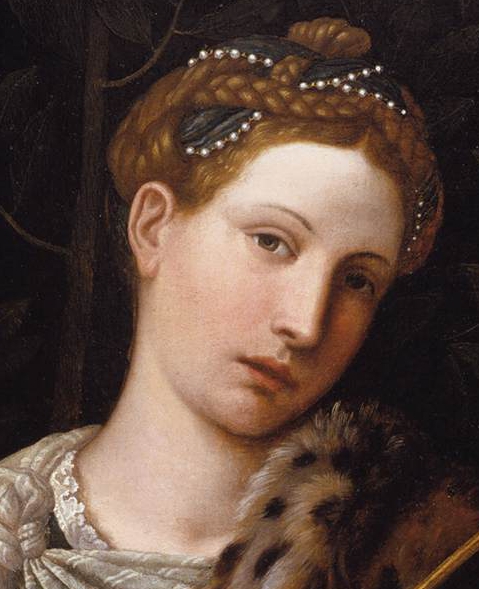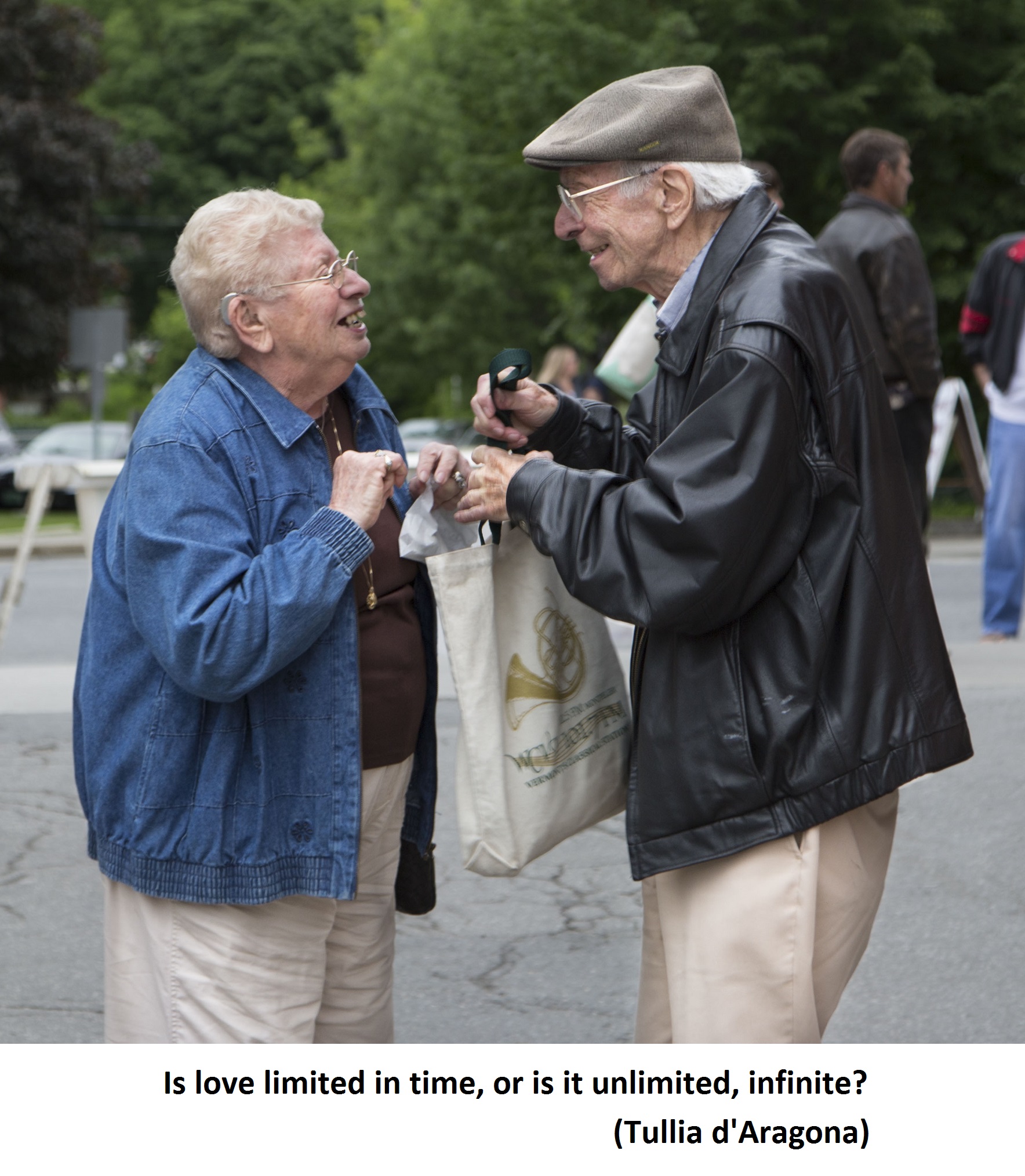|
The impossible desire to merge with the beloved
 Tullia d'Aragona (1510–1556) was an Italian poet and philosopher. Like her mother, she was a courtesan (a court lady, companion of powerful persons), and was lucky to be born during a limited period of time when courtesans were given relative economic and social freedom. (Later in her life, Italian society became more conservative.) As a child, she was educated in the classical humanities by a Cardinal who was probably her biological father, and she demonstrated special intellectual gifts and interests. As a young woman she became successful as a poet and writer, and was in touch with important intellectuals and poets, some of whom were her lovers. She later turned her house into a philosophical academy. Not much is known about her last years, but it appears that her health was gradually declining until her death. Tullia d'Aragona (1510–1556) was an Italian poet and philosopher. Like her mother, she was a courtesan (a court lady, companion of powerful persons), and was lucky to be born during a limited period of time when courtesans were given relative economic and social freedom. (Later in her life, Italian society became more conservative.) As a child, she was educated in the classical humanities by a Cardinal who was probably her biological father, and she demonstrated special intellectual gifts and interests. As a young woman she became successful as a poet and writer, and was in touch with important intellectuals and poets, some of whom were her lovers. She later turned her house into a philosophical academy. Not much is known about her last years, but it appears that her health was gradually declining until her death.
The following passages are adapted from Aragona’s book Dialogues on the Infinity of Love (1547), a book that became popular in her time. In the 16th century, there was much philosophical interest in love, and Aragona was part of this trend. Most of the book is a dialogue between Aragona and Benedetto Varchi, who in real life was a famous intellectual from Florence, and was also her friend and supporter. The dialogue is probably fictional, although some scholars believe that it is based on a real conversation.
Aragona and Varchi are discussing here whether love is “infinite” – in other words, whether love is a desire that aims at a specific goal, so that it ends once the lovers achieve what they desire. Aragona suggests that although love has a goal, this is an impossible goal, and therefore it is never satisfied. In order to make this point, Aragona distinguishes between two kinds of love: “vulgar” love in which the lover seeks satisfaction, and “honest” love in which the lover has the impossible desire to merge with the beloved, both spiritually and bodily, and become one.
TULLIA: The desires of people in love are infinite, and they can never rest after achieving something. This is because after getting it, they long for something else, and something else again, and something more after that. And so it goes on, one thing after the other. They cannot be satisfied, as Boccaccio tells about himself in the introduction to his Decameron. This is why people who are in love can be crying one minute and laughing the next. They can even laugh and cry at the same time. This phenomenon is amazing and quite impossible for normal mortals! Lovers have both hope and fear. They feel great heat and excessive cold at the same time. They want and they reject in equal measure, constantly grasping things but holding nothing. They can see without eyes. They have no ears but they can hear. They shout without a tongue, they fly without moving. They are alive while dying. They say and do the many strange things that the poets write about.
[…]
 VARCHI: So finally you have concluded that love is infinite, so that one cannot love within limits, since lovers always have new desires, and they are never satisfied with what they get without longing for something more. Isn’t that so? VARCHI: So finally you have concluded that love is infinite, so that one cannot love within limits, since lovers always have new desires, and they are never satisfied with what they get without longing for something more. Isn’t that so?
TULLIA: Perfectly true.
VARCHI: Now, against this conclusion I argue thus: […] If all those who reach their purpose stop searching for it, it necessarily follows that all lovers who attain their aim become satisfied, and they no longer love.
TULLIA: That is undeniable.
VARCHI: Therefore, love has an end, and it is therefore possible to love within limits. So the conclusion you reached earlier was incorrect.
TULLIA: No, I drew that conclusion correctly […] The word “love” is polyvalent, and can stand for several kinds of loving. And you didn’t ask me which kind I meant.
VARCHI: Ah, Signora Tullia! You have got me there!
 TULLIA: […] Let me say that love is of two types. We shall call the first “vulgar” or “dishonest” love, the other “honest,” in other words virtuous. Dishonest love – which is found only in vulgar or low-minded individuals (whose soul is low and despicable, who lack virtue or refinement, whether they are from noble or insignificant families) is generated by a desire to enjoy the loved object, as it is with common animals. They simply want to obtain pleasure, and to give birth to someone who resembles themselves, without any further thought or concern. Those who are moved by this desire, and who love in this way, once they reach their goal and satisfy their longing, no longer love. […] Of course, I was not considering this type of love. TULLIA: […] Let me say that love is of two types. We shall call the first “vulgar” or “dishonest” love, the other “honest,” in other words virtuous. Dishonest love – which is found only in vulgar or low-minded individuals (whose soul is low and despicable, who lack virtue or refinement, whether they are from noble or insignificant families) is generated by a desire to enjoy the loved object, as it is with common animals. They simply want to obtain pleasure, and to give birth to someone who resembles themselves, without any further thought or concern. Those who are moved by this desire, and who love in this way, once they reach their goal and satisfy their longing, no longer love. […] Of course, I was not considering this type of love.
VARCHI: I certainly believe you, because I know that your noble heart would never stoop so low to even think of talking about such low matters. But please go on.
TULLIA: Honest love, which is characteristic of noble people (people who have refined and virtuous tendencies, whether they are rich or poor) is not generated by desire, like the other love, but by reason. Its main goal is to transform oneself into the object of one’s love, with a desire that the loved one would be converted into oneself, so that the two lovers may become one. […] And this transformation can only take place on a spiritual level. So in this kind of love, the main part is played by the “spiritual” senses, those of seeing and hearing, and above all the imagination, since it is closest to the spiritual. But in fact, the lovers also desire to achieve a bodily union, in addition to a spiritual one, in order to reach a total identification with the beloved. And since this bodily unity can never be achieved – because it is impossible for physical bodies to merge into one another, the lovers will never satisfy their desire. Therefore, love is not limited, as I concluded earlier. […]
VARCHI: Everything you said has pleased me highly and filled me with ineffable sweetness.
|